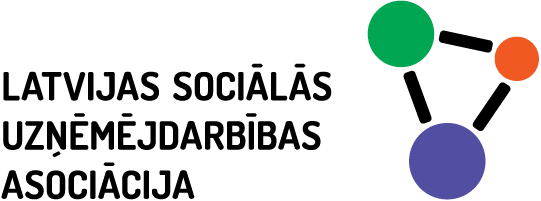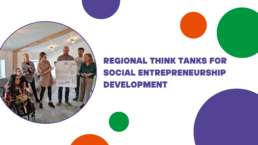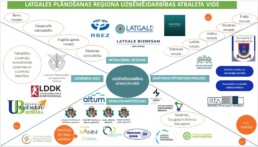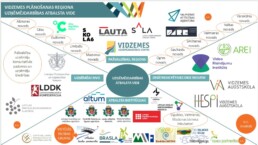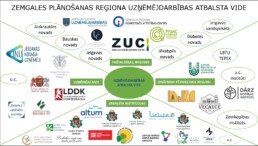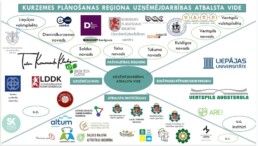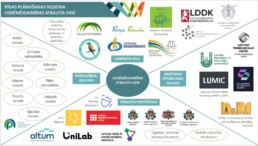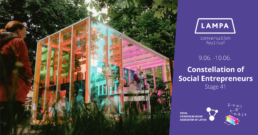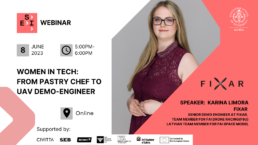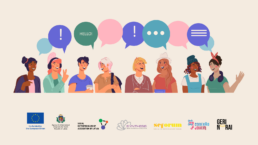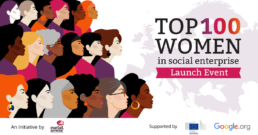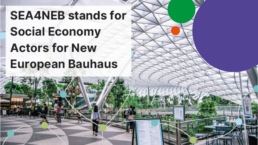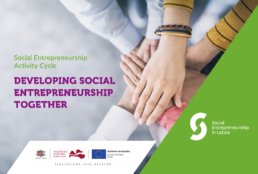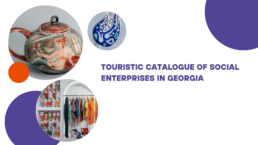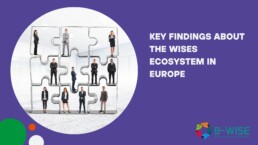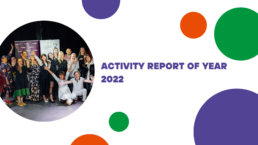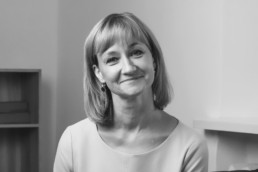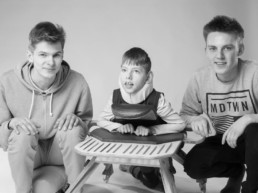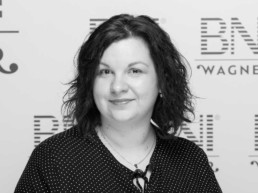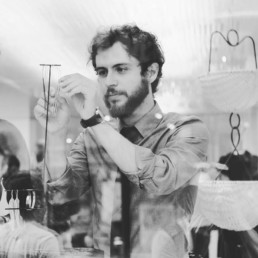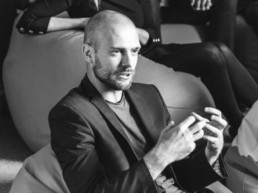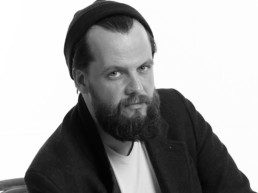Regional Think Tanks for social entrepreneurship development
REGIONAL THINK TANKS
The social entrepreneurship ecosystem comprises a variety of stakeholders who together create a strong and supportive environment for the development of social enterprises. Strengthening this ecosystem is important as it fosters sustainable and socially impactful entrepreneurship that generates positive impacts for both society and the environment. In order to promote understanding and involvement of all stakeholders in strengthening the social entrepreneurship ecosystem, we bring together in regional think tanks opinion leaders, entrepreneurs, representatives of different organisations and municipalities with the will, opportunity and resources to strengthen and develop social entrepreneurship in the region, as well as social entrepreneurs themselves. The aim of the Think Tanks is to understand the role of each stakeholder and to prepare concrete action plans (actions here and now, not visions of the future) to strengthen and develop social entrepreneurship in each region.
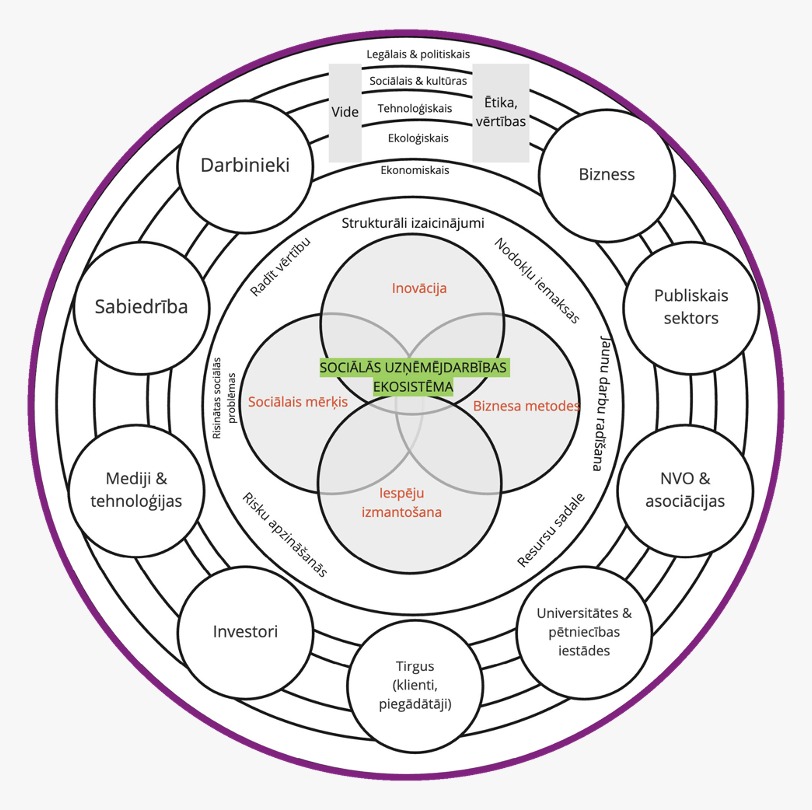
AN ACTION PLAN FOR STAKEHOLDERS
During the workshop, each stakeholder - policy makers, support organisations and social enterprises - developed an action plan for themselves and for other stakeholders for the development of social entrepreneurship with concrete actions. We summarised what was said in the regional think tanks in a common way.
- Include social entrepreneurship in current planning documents and follow up their implementation; Prioritise social entrepreneurship in planning documents
- Smart" financial resources to motivate social enterprises (grants, etc.)
- Implement socially responsible public procurement
- Delegation of national/municipal functions and services to social enterprises
- Information support (campaigns, etc.), Implement marketing activities, Provide information support; Information campaigns on social entrepreneurship in general and on social enterprises.
- Reducing administrative barriers; Reducing bureaucracy
- Educating national/municipal staff on social entrepreneurship
- Allow social enterprises to share part of their profits
- Encourage changes in legislation - tax policy (reduction of social security contributions); Improvement of tax policy (GST; labour taxes; generally tax rigid); Additional state support - tax incentives and reduction of red tape;
- Support for employment of target groups; Reduction of labour costs
- Improving the definition of a social enterprise - could reconsider whether social enterprises can only be LLCs; complicated process and no consensus; Allow associations to be granted social enterprise status.
- Implement business support programmes
- Political will
FOR LOCAL GOVERNMENTS
- Identify the social needs and problems in their territories, define the needs that can be delegated to social enterprises.
- Identify existing resources to address social problems; Identify available vacant real estate in municipalities and inform about the possibility of using it for social enterprises, Identify infrastructure(s) that can be offered to social enterprises for use; Ensure availability of infrastructure
- Delegate / transfer municipal functions to social enterprises
- Inform the public about social entrepreneurship opportunities, organise training
- Provide social enterprises with funding, tax breaks and various resources for free use
- Include points on social entrepreneurship in municipal funding competitions;
- Support programmes in municipalities or grant programmes for social enterprises.
- Promote social entrepreneurship on municipal channels - websites, social networks, etc.; Promote support and
- good stories of social enterprises on municipal communication channels
- Organise training for different social entrepreneurship organisations (both LLCs and associations)
- Financial support - tax incentives, grants, socially responsible public procurement
- Organise networking events
- Practice socially responsible procurement
- Proactively provide support and necessary information to social enterprises
FOR SUPPORT ORGANISATIONS
- Include specific support for social enterprises in organisations' strategies
- Develop closer cooperation with the Latvian Social Entrepreneurship Association and social enterprises - meetings, events; promotion of the LSUA annual pitch competition "TAM LABAM BŪS AUGT"
- Promote social enterprises and encourage knowledge exchange; Promote good practice examples; Promote social entrepreneurship and social enterprise products on own channels
- Inviting social enterprises to guest lectures at universities to share experience stories; Organising meetings at LIAA business incubators on social entrepreneurship; ALTUM consultations for social enterprises; Cooperation with business associations - LIAA business incubators, LLKC, Kurzeme NGO Centre
- Information campaign on social entrepreneurship in a particular region / city by local authorities and partners
- Promotion of social entrepreneurship - idea creation workshops; Seminar series on opportunities in social entrepreneurship (cross-sectoral cooperation); Educational, informative events for citizens, entrepreneurs, students; Success, experience stories "Social entrepreneurs compass", Social entrepreneurship festival; ZUK; Social entrepreneurship ideas competition; Creation of idea bank; Creation of educational offer package on social entrepreneurshipProvide new knowledge and consultations to social entrepreneurs; Provide consultations, mentors; Organise trainings for social entrepreneurs; Mentor a social entrepreneur for at least 1 year (if there is funding for such activity); Quick consultations by phone - LIAA business incubators, LLKC, Kurzeme NGO Centre;
Legal advice (if there is funding for this activity); Mentoring sessions - Establish/facilitate dialogue between social entrepreneurs and clients
- Networking - promote exchange of experience of social entrepreneurs abroad; Organise various networking events, e.g. business breakfasts for social entrepreneurs in cooperation with entrepreneurs, local action groups and ALTUM; Organise networking events - partnerships, LIAA business incubators, NGOs; social entrepreneurs matchmaking
- Take responsibility for the commitments/targets written in the project applications (net turnover growth, job creation, etc.)
- Support existing enterprises to develop a new social service (by giving these enterprises a separate NACE code in addition to the social activity)
- Funding for projects to promote and support social entrepreneurship - partnerships, LLKC, ALTUM; project opportunities; Promote the development of social entrepreneurship in project competitions, prioritise it - include it in evaluation criteria, higher intensity of support
- Implementation of studies
FOR SOCIAL ENTREPRENEURS
- Cooperation with local authorities; Develop cooperation with local authorities and NGOs
- Knowledge development; Educate the public and yourself about social entrepreneurship; Encourage others
- Share experiences; Share your experience and knowledge
- Build and strengthen community, promote participation; Visit villages; Networking
- Promote your visibility (need support for marketing activities); Speak up; Use the social enterprise brand (logo "Social Entrepreneur" developed by the Ministry of Welfare)
- Clearly define your product and service offering; Highlight and communicate your social impact; Achieve and highlight social objectives (more support needed);
- Develop social entrepreneur DNA - identify societal wellbeing needs; strengthen business model / how to monetize; develop and maintain external image; promote successful businesses and collaboration models; value choices - promote socially responsible choices in society; long-term strategic support needed
- Develop and promote industry lobbying
- Be very specific about your needs to both policy makers and support organisations
- Establish a regional advisory board for social enterprises to facilitate cooperation with local authorities; Continue to pursue its objectives through mutual cooperation in the region
- Maintain and improve the work skills of people with disabilities
- Don't forget about profit! 🙂
- STRUGGLE while resources are not "burnt out"; Continue to be these "amazing people"; KEEP DOING! 🙂
Pay workers salaries; Raise the prestige of professions (e.g. carer)
BENEFITS & NEXT STEPS
After each of the Think Tanks, we invited the stakeholders to give their assessment of the experience, as well as concrete actions that the participants plan to implement to develop social entrepreneurship in their daily lives, as well as future actions needed.
- New insights and ideas; Get a feel for the current situation in the sector to draw conclusions on the acute situation; Gain more knowledge on the topic of social entrepreneurship, get ideas for future work and get to know different interest organisations; Become clearer what social entrepreneurship is and what it can bring to society and to the entrepreneur himself; Opportunity to understand how other municipalities are doing in this field
- Meet people from other sectors than social entrepreneurs; Meet other social entrepreneurs and associations; New contacts, knowledge; Opportunity to meet and talk about topical issues
- New contacts, concrete plans for future cooperation; Mutual contacts and meetings; Getting to know colleagues in other municipalities; Finding a cooperation partner; Getting to know new social enterprises, discussing cooperation opportunities
- Overview of stakeholders, perception of the attitude, understanding of state and municipal representatives; what kind of support is available, vision of social entrepreneurs themselves, expectations
- I realised that I am not the only "crazy one" who is not really making money from social entrepreneurship with the existing conditions to run and develop the organisation
- I have gained the point of view and perspective of the entrepreneurs themselves, which helps me to better understand what they expect from support institutions and how we can help them; Clearer understanding of what we can do as an institution for the development of social entrepreneurship; I have learned more about what support institutions still provide
- My benefit was definitely the informal atmosphere on a Friday, on a working weekend, super positive atmosphere, bright, good, determined people! The presentations of the SU tables themselves were very impressive, big, big malachi! So the benefit is that I really learnt a lot of new things, got inspired by the SUs themselves and hats off to you, LSUA, as organisers! You did it, I felt like I was amongst my own people, thank you very, very much and have a great rest of the year!
- I have a clear task that I plan to implement in the coming year to improve the social enterprise ecosystem.
- Practical lessons from partners and recommendations for improving social entrepreneurship policy and developing support instruments.
How will you use the action plan developed in the Think Tank?
- More cooperation with other social enterprises in your region
- For work purposes, in conversations with entrepreneurs; In our daily work; We will try to incorporate the guidelines into our daily work
- Where possible, include actions supporting social entrepreneurship in the strategy of the Local Action Group; Evaluate and incorporate into near or distant objectives.
- Always take into account the actions and proposals developed by the different working groups and plans; Take into account when planning actions to promote social entrepreneurship; Use the action plan in future work, when developing the development strategy; When planning work; Include the action plan in the activities planned by the organisation; Use within the organisation and with the municipality
- In our own municipality we will continue the 1st step we have just started - meeting our social entrepreneurs, the 2nd step will be visiting them and getting to know each other
- I will share the information with my colleagues and stimulate a discussion on how to improve the support measures for social entrepreneurship.
- Activities for implementation, ideas for projects
- Work in the Interreg Europe project; new project ideas, linking with the RPR Development Programme Action Plan 2021-2027
- Negotiation with the municipality
- I will definitely use in the future to strengthen links with business and support institutions.
- The Action Plan is more useful for broadening the horizon, so to speak, for understanding the SU ecosystem, and that is not a small thing.
What kind of further social entrepreneurship activities would be most useful to you?
- Outreach to entrepreneurs who would like to follow this path; Outreach on support opportunities - I understand that social entrepreneurs are concerned about a fairly near future in their field; Outreach, practical training
- Statistics on existing social enterprises, dynamics of registration/ dissolution, use of financial instruments (from Altum) and fulfilment/non-fulfilment of project commitments
- Regional meetings for social entrepreneurs and stakeholders to strengthen them; Stories from social entrepreneurs' own experiences (positive and negative) to inspire and learn from mistakes
- Camp
- Events to educate entrepreneurs in the territory of the Society's activities, organised in cooperation with the Latvian Social Entrepreneurship Association.
- Stories of social enterprises' experiences and different municipalities' views on the role of social enterprises (support or not and if not, what is missing?)
- Shadowing events
- Networking, exchange of experience; Information exchange, networking
- Meetings with experts who can help with concrete recommendations for the implementation of the action plans of the following think tanks
- Continue with this format of cross-sectoral think-tanks, as I think that very important issues were raised, it was important to hear the perspectives of the stakeholders, so it is worth continuing with these events in the future
It is important to exchange experiences beyond the borders of the LV as well, for the representatives of the - Ministry, support organisations and social enterprises, in order to understand that we need to spend less resources on standing out and more on investing in the people who do the work
- All is well and will be well, good luck to you!
Regional Think Tanks were held as part of the Ministry of Welfare's Social Entrepreneurship Activity Series "Developing Social Entrepreneurship Together!" funded by the European Social Fund. The diverse activities of the cycle, planned to strengthen and develop the social entrepreneurship ecosystem in Latvia, will run until November 2023. They are implemented in cooperation with sector organisations - the Latvian Social Entrepreneurship Association, the associations "New Door", "Reach for Change Latvia" and the social enterprise "Visas Iespējas".
The "Constellation of Social Entrepreneurs" stage at LAMPA conversation festival
On 9 and 10 June, we invite you to Cēsis, where the 9th LAMPA Conversation Festival will take place, dedicating for the first time a two-day stage the "Constellation of Social Entrepreneurs" to social entrepreneurship!
"The Constellation of Social Entrepreneurs" offers a diverse and exciting programme with more than 10 different events throughout the festival that will inspire, inform and provide practical knowledge not only about the daily life of social entrepreneurs, but also focus on 3 main themes - social entrepreneurship, inclusive society and innovation in education. The Social Entrepreneurship Association of Latvia, by involving its members - social entrepreneurs and social entrepreneurship support organisations - offers an engaging platform to stimulate discussion on the changes social entrepreneurs are making in promoting an inclusive society and innovations in education. In between the events, everyone will have the opportunity to participate in the creative and musical activities of the social enterprise "Zvaigznāja komanda", experiencing the creative platform "Zvaigznāja kubs" (Constellation Cube)*!
We invite you to take a look at the programme of the "Constellation of Social Entrepreneurs" stage and attend the events of your interest:
- KANO EDITIONS presents a discussion and masterclass "Learning through play and creativity"
- Social enterprises Liberated and Mobilcentrs encourage a discussion on "Invisible abilities - how to include otherness?"
- The social enterprise "Barboleta" organises a discussion on "Motivation and innovation in education"
- Mentor Latvia presents the discussion "YES! Young people start independent life! How?"
- The social enterprise "RABARBERS" paediatric private practice develops the workshop "Čīkstētava - support group for parents"
- Social enterprise, Latvian parents' organisation "Mammām un Tētiem" organises a discussion "Who is wiser in family matters - mum or dad?"
- RTU Riga Business School presents a discussion "When Latvia innovates education, we get to Harvard, Buffalo and MIT"
- Social enterprise "Ligero" organises a conversation "Job opportunities for all!"
- Social enterprise "Invisible World" presents an interactive discussion "The Invisible World: close your eyes and see - education through entertainment in the dark"
- Social Entrepreneurship Association of Latvia invites to the social entrepreneurs' charades "Don't Knock Empty Straws!"
"Zvaigznājs kubs" is a creative platform for the social enterprise "Zvaigznājs", which will give everyone the opportunity to try out their talents all day long - it is an interesting, intriguing physical place that allows you to explore musical instruments, the process of writing music and bring your creative potential to life. Through the platform, the company is pursuing a social goal of empowering children and young people in the regions - 23 free music education events were held across Latvia in the summer of 2022.
ESI Student Innovation Program invites you to participate in a webinar about women in tech hosted by FIXAR
ESI Student Innovation Program invites you to participate in a webinar about women in tech hosted by FIXAR ESI Student Innovation Program of the Stockholm School of Economics in Riga invites you to participate in an online webinar on June 8 at 17.00. The seminar will be led by Karina Limora, Senior Demo Engineer at FIXAR, a Latvian team member of FAI Drone Racing (F9U) and a Latvian team member for FAI Space Model.
Webinar topic: Women in Tech: From Pastry Chef to UAV Demo-engineer.
Karina Limora, a Senior Demo Engineer at FIXAR, will share her inspiring story. Karina finished school as a pastry chef, while her hobby was teaching kids aero modeling and building spaceships. Now, working with UAVs is her full-time job. Karina’s story shows that, with passion, it is possible to achieve any goal. Now she wants to encourage other women to dream big and work in the tech industry.
FIXAR is a leading software and aircraft design developer, powering commercial autonomous UAVs for industrial applications. Karina will share the daily challenges of working in a fast-paced deep-tech startup. FIXAR was founded in 2018 by Vasilijs Fainveits in Latvia, the company was established in 2019 using a startup visa. Currently, a little over 30 people work in Latvia. FIXAR sells its products in Eastern Europe, Asia, Africa, Japan, Brazil, Canada and the US. One of the most well-known products is FIXAR 007– a drone that is autonomous and can fly up to 1 hour without additional battery charging.
The webinar will be held in English and take place online (a link will be shared with each participant shortly before the event). This seminar will be inspiring for anyone who wants to start a career in a deep-tech startup and gain new professional connections. Join this webinar to learn the full story.
You have to register here: https://forms.gle/JW6egawDEiS3GdSw5.
The ESI program is co-financed by the European Regional Development Fund, SEB and RIMI. Project number: 1.1.1.3/21/A/008.a.
ESI is supported by: The ESI program is jointly implemented by several representatives of education and industry – Stockholm School of Economics in Riga, Latvian Academy of Arts, Riga Graduate School of Law, Rezekne Academy of Technology, consulting company Civitta Latvia and industry partners (Latvian Social Entrepreneurship Association, Zero Waste Latvia, Techhub, Institute of Solid State Physics, University of Latvia, Rezekne Business Association, Latvian Electrical and Electronics Industry Association). More information about the ESI Student Innovation Program and application for other events:
Website: https://esi-startup.lv/
Facebook page: https://www.facebook.com/ESIdrosmigs
LinkedIn page: https://www.linkedin.com/company/esidrosmigs
E-mail:
5 useful steps to create cooperations between local governments and community organisations
Successful cooperation and the creation of meaningful synergies between local authorities and community organisations is an effective way to improve the quality of life and well-being of local people, while creating new opportunities in the area.
By exploring good practices in several European countries – Latvia, Lithuania, Sweden, Portugal and Cyprus – and examining examples that should be avoided, various actions and steps for developing an effective approach to cooperation are summarised in the report “Tools for enhancing cooperation between local governments and community-based youth organisations“. Benefits of strong collaborative practices between local government municipalities and non-governmental organisations are manyfold and well-recognised, and should benefit all involved parties, including community organisations, municipalities, and intermediate organisations.
The report starts by describing the results of a needs analysis to help understand the challenges and needs related to building cooperation between community-based organisations working with young people or aiming to improve young people’s lives and local authorities. Next, the steps to develop a shared vision when forming a partnership are identified.
Five steps to help build meaningful and sustainable cooperations:
- Define and articulate a common outcome
- Establish mutually reinforcing or joint strategies
- Agree on roles and responsibilities
- Establish compatible policies, procedures and other means to operate across organisational boundaries
- Develop mechanisms to monitor, evaluate, and report on results.
Furthermore, local authorities can support NGOs and local social enterprises through financial relationships: funding, grants and subsidies or even through service contracts (public procurement), but also by providing government resources, consulting and other creative ways of cooperation. The report examines the following legal forms of cooperation:
- Public procurement of services
- The municipality provides space and resources
- Project funding
For each of these steps and types of cooperation explanations, suggestions and useful resources to help to prepare for cooperation, as well as examples of partnerships between different organisations are offered.
At the end of the report, potential issues in forming a partnership are discussed, and how to avoid them so that the experience of working together is a positive one for all parties involved.
Read more about cooperation between local authorities and community-based organisations HERE.
The above mentioned outputs were created in the context of the project “Enhancing youth capacity in municipalities and encouraging mutual cooperation using social entrepreneurship as a tool, LOCAL-Y-MPACT” The objective of the project “LOCAL-Y-MPACT” is to strengthen the cooperation between community based youth organisations and social enterprises and local municipalities, and promoting social entrepreneurship as an effective tool for reducing economic inequality, promoting social inclusion and integration, creating resilient society and fostering active participation within local communities.


Toolbox available in:
Greek
Latvian
Lithuanian
Portuguese
Swedish
Four Latvians make it to Europe's Top 100 Women in Social Entrepreneurship!
For the third time, Euclid Network (the European Social Entrepreneurship Network), which brings together 100 000 organisations in 21 countries, has created a European-wide top list of women in social entrepreneurship. This year, four women from Latvia are among the 100 European leaders in social entrepreneurship!
From over 900 nominations, the jury selected 100 women with outstanding leadership skills and a commitment to do more, inspiring other women to reach their potential in social entrepreneurship by their example. The women nominated have successfully implemented social projects with a positive social impact on a wide range of scales, contributing to the achievement of the UN Sustainable Development Goals.
The prestigious list from Latvia includes Regita Zeiļa, Director of Social Entrepreneurship Association of Latvia, Agnese Frīdenberga, Main Researcher at the Centre for Public Policy "PROVIDUS", Diāna Lapkis, founder and CEO of social entrepreneurship accelerator NEW DOOR, and Inga Muižniece, founder and CEO of social enterprise - call centre "Sonido", who has been included in the list repeatedly.
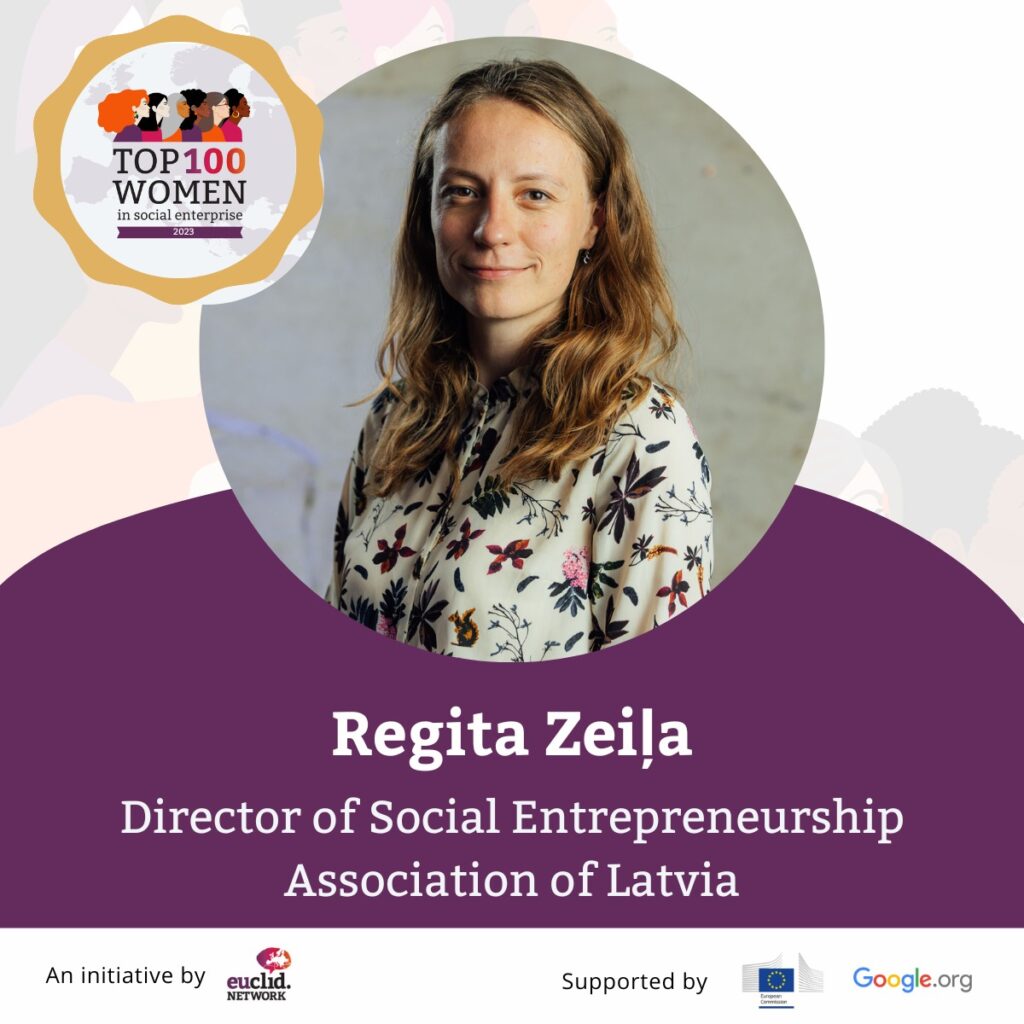
Regita Zeiļa, Director of Social Entrepreneurship Association of Latvia, has been working in the social entrepreneurship sector since 2017, since then she has established a network of social entrepreneurship ambassadors, conducted research in 2019 that resulted in a database of potential social entrepreneurs in 10 Latvian municipalities, and in 2020, at just 24 years of age, she became the director of association. In 2022, her active work in advocacy for social enterprises resulted in the inclusion of social entrepreneurship development in the government declaration, making it a national priority.
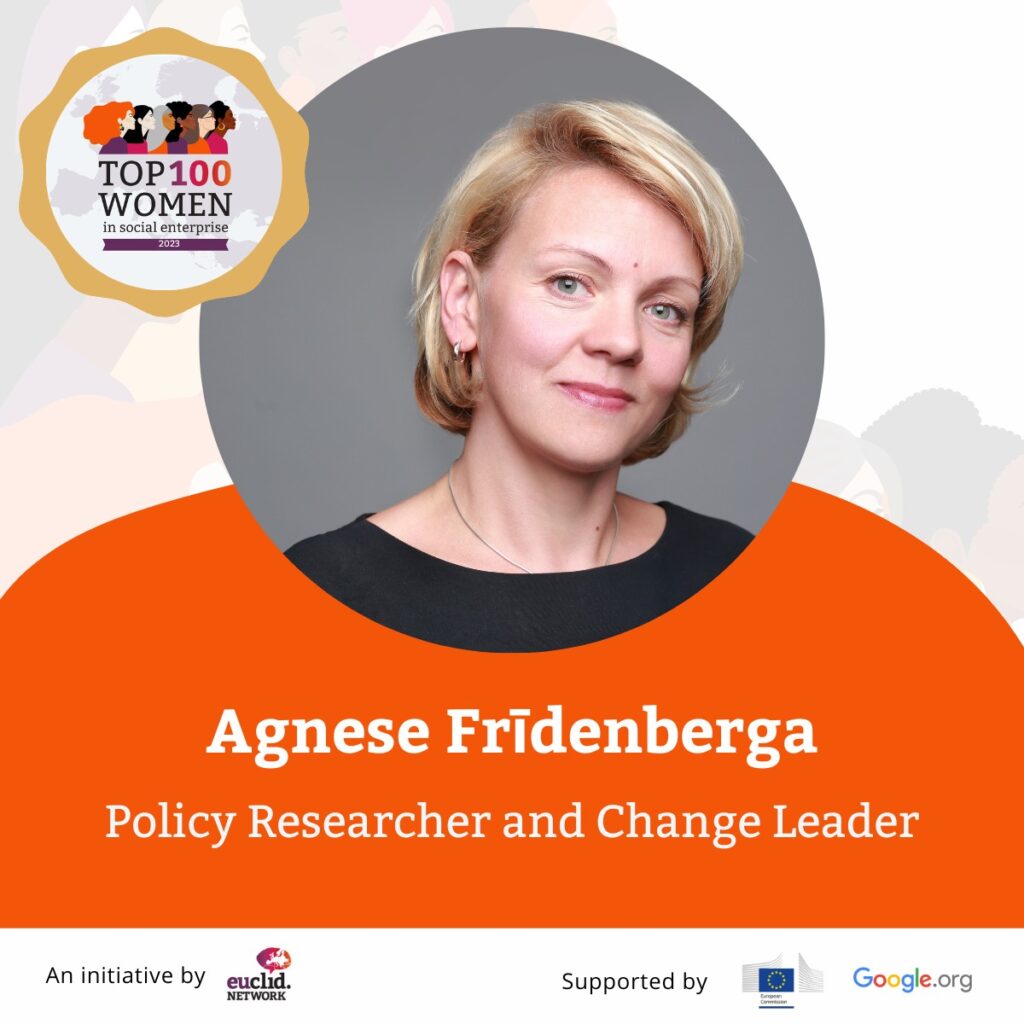
Agnese Frīdenberga, together with the PROVIDUS team, initiated research on social entrepreneurship by conducting the study "Latvia on the Road to Social Entrepreneurship" in 2012. In the following years, she was involved in the founding of the Social Entrepreneurship Association of Latvia, the development of the Social Enterprise Law, and is currently active in the Council of the Latvian Social Entrepreneurship Association, the Social Enterprise Commission of the Ministry of Welfare, researching the role of socially responsible public procurement and informing about its opportunities.
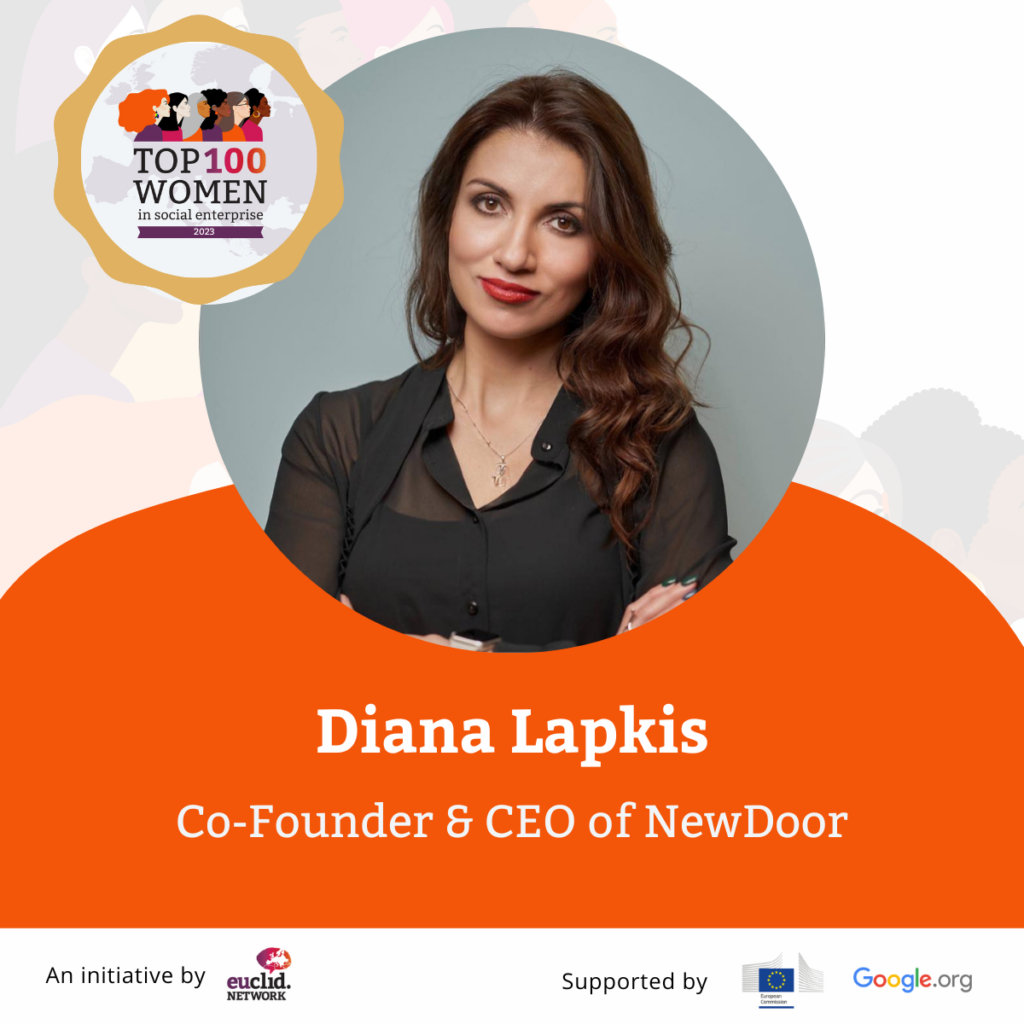
Diana Lapkis is co-founder and CEO of the international social entrepreneurship and innovation platform New Door and the first social entrepreneurship accelerator in the Baltic States. She is also an active consultant in the fields of social entrepreneurship, social innovation and corporate social responsibility, as well as a mentor for social entrepreneurs and a member of the Social Enterprise Commission of the Ministry of Welfare.
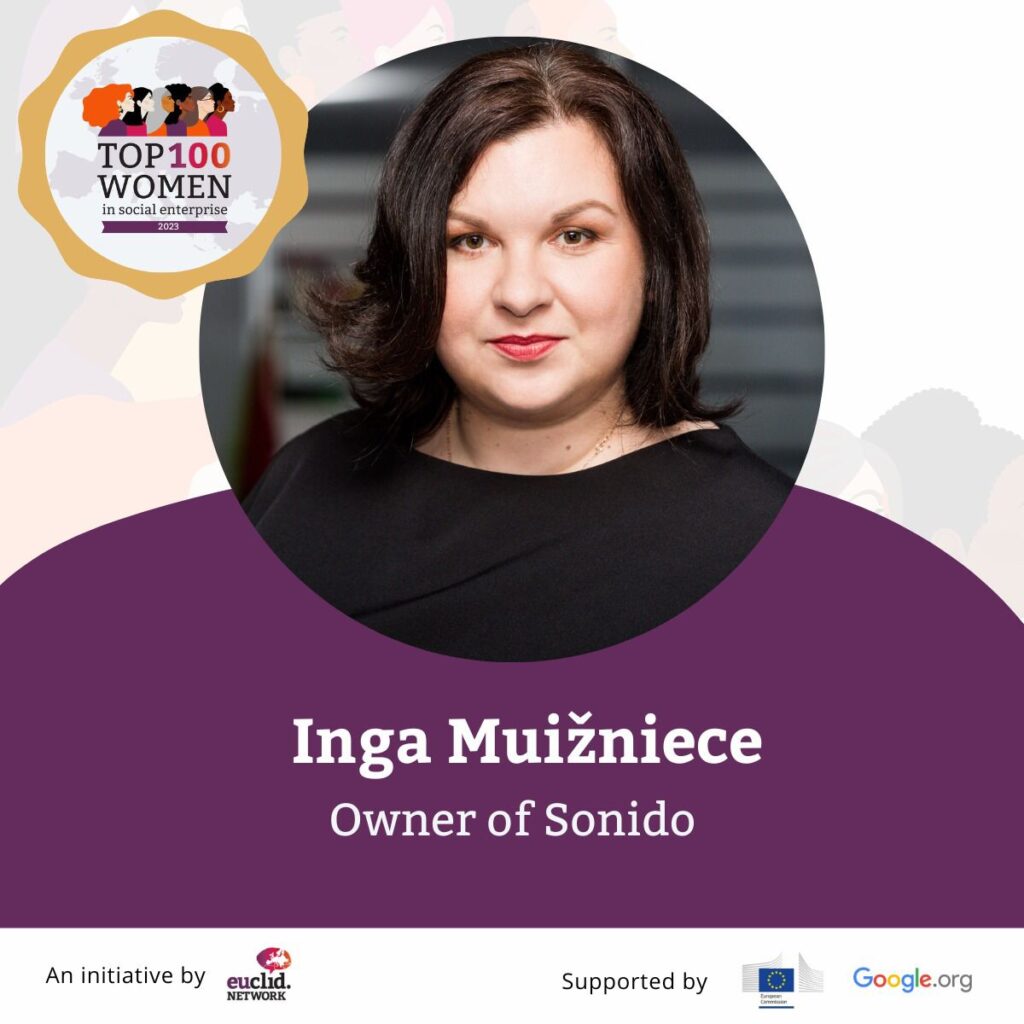
Inga Muižniece is the owner of work integration social enterprise "Sonido" and creates job opportunities for people with disabilities. In addition to her commercial activities, Inga Muižniece has also launched an unusual social project "Let's Talk" - a telephone line for people suffering from loneliness. It is a story of a step closer to an inclusive society and work integration, which has also been recognised with the "Disabled People of the Year Award 2020" in the category "Promoter of Employment". Sonido's social project "Let's Talk" was created in autumn 2018 to give people who feel lonely the opportunity to call someone and be listened to. Since then, the 26564564 line has received almost 21 000 calls.
The European Top 100 is designed to celebrate women in social entrepreneurship. These are challenging times, not only in Latvia but also around the world, and it is often women who offer innovative approaches to solving societal problems, including and not forgetting the interests of different groups in society.
See the full list here: https://euclidnetwork.eu/2022/03/top-100-women-in-social-enterprise-2022/
Social Economy Actors for New European Bauhaus (SEA4NEB)
The New European Bauhaus (NEB) is an environmental, economic, and cultural project, launched by the European Commission in October 2020, that aims to combine design, sustainability, accessibility, affordability, and investment in order to help deliver the European Green Deal and connect it to our living spaces. The NEB then proposes to be an interdisciplinary project, acting as a bridge between the world of science and technology and the world of art and culture, and re-thinking the opportunities green and digital challenges could bring to our lives.
Partners from three European countries have collaborated to create a project ‘SEA4NEB’ that addresses the specific theme: Social transformation through New European Bauhaus. Social Economy Enterprises (SEEs) can play a crucial role within the New Bauhaus Initiative, since they seem to be appropriate for regenerating abandoned spaces, with an inclusive, green and local community development approach. SEEs have already proven to be resilient and capable to play a crucial role in recovering from economic crises, especially when they operate in an enabling ecosystem driven by supportive public authorities.
The project ‘SEA4NEB’ aims at promoting social economy models to contribute to the New EU Bauhaus and at how they can foster spatial and sectorial clusters, taking an ecological approach to cultural cooperation and territorial development with local authorities. It focuses on good practices of “SE NEBs”, which are territories regenerated according to NEB principles by or with a strong intervention of SE actors and local authorities. The whole methodology of the project is based on a strong partnership at local level between the local authority and the SE actor, while Diesis Network will act as transnational facilitator and coordinator. The social economy missions will be organised using the methodology of the peer review.
The partnership:
- EU Umbrella organisation: Diesis Network
- Croatia : municipality of Split and CEDRA
- Latvia: Luznava Manor and SEAL
- Italy: Municipality of Roccavaldina and Foundation Horcynus Orca.
The outputs of the project will be:
- 6 case studies and 3 peer reviews background paper and final reports
- 3 local action plans
- 1 set of strategic recommendations for replication
- 1 set of EU level recommendation
- 1 on-line platform
Ministry of Welfare announces applications for social entrepreneurship support programmes
From 5 to 30 January, the Ministry of Welfare is announcing applications for social entrepreneurship acceleration and incubation programmes. Both programmes are free and open to social enterprises and social entrepreneurship idea authors.
The acceleration programme is run by New Door and is aimed at social entrepreneurship idea authors - individuals and legal persons who have an idea for social entrepreneurship or are currently implementing a social project and would like to turn it into a sustainable, profitable business. The Social Entrepreneurship Acceleration Programme will provide knowledge and personalised expert support to aspiring social entrepreneurs on their journey from idea to sustainable business plan, while fostering participants' personal growth and understanding of entrepreneurship. Three months of intensive training from February to May will help to take you from an idea to a real business development plan and its implementation. The programme will accommodate 10 to 15 participants and is open to individuals or teams of up to three.
Anyone interested can find out more about the acceleration programme at an open day on 17 January at 18.00 in person at the Oracule Tang co-working space, Doma laukums 2, Riga, and online at the Ministry of Welfare's Facebook account.
The incubation programme is implemented by "Reach for Change Latvia" and is intended for existing social enterprises that have obtained the status of a social enterprise and wish to strengthen their capacity and receive support for business development. The eight-month programme will run from March to October and will be an opportunity to improve your skills and increase your knowledge in areas such as effective solution development, financial sustainability, leadership, team building, learn how to increase your income and find new opportunities and contacts for business development under the guidance of various experts. The incubation programme will welcome five to eight participants and the selection process will take place in three rounds.
More information about each ativity and application forms can be found here: www.sua.lv/kopa
The acceleration and incubation programmes are part of the Ministry of Welfare's Social Entrepreneurship Activity Series "Developing Social Entrepreneurship Together!", funded by the European Social Fund. The cycle's diverse activities, planned to strengthen and develop the social entrepreneurship ecosystem in Latvia, will run until November 2023. They are implemented in cooperation with sector organisations - the Latvian Social Entrepreneurship Association, the associations "New Door", "Reach for Change Latvia" and the social enterprise "Visas Iespējas".
Touristic catalogue of social enterprises in Georgia
Social entrepreneurs are very diverse and their involvement in the tourism sector is a step towards a more inclusive environment and accessibility. Recent tourism trends also show that tourists prefer to experience local culture, traditions, seek interesting offers, sustainable solutions and buy products and services that have a positive social impact, as well as support local businesses and communities.
Social Entrepreneurship Association of Latvia in cooperation with the Social Enterprise Alliance (SEA) and the Regional Sustainable Development Institute (RSDI) of Georgia created a touristic catalogue of social enterprises in Georgia.
The Catalogue presents a number of tourist itineraries with the destination of various social enterprises in Georgia. The catalogue uncovers more than ten social enterprises in Georgia, explains their work and social purpose, and explores the services and products they offer. It is designed in such a way that when planning a trip to Georgia, you can plan to visit social enterprises in different regions of Georgia. The social enterprises included in the catalogue are the ones offering their products, various workshops and delicious meals:
- Ikorta, a social enterprise, makes jewellery and provides job opportunities for women who had to leave their homes and relocate as a result of the war.
- Tsnuli, a social enterprise, employs and integrates people with disabilities in a woodworking and design weaving workshop.
- Nukriani Workshops, a social enterprise, offers various workshops, gifts and corporate souvenirs and provides training and job opportunities for local women to promote employment and economic development in the region.
- Temi is an organisation that works with organic farming, offers wine tasting, aims to provide shelter for socially vulnerable people, create a family environment, employment opportunities and improve their job skills.
- Alaverdi Blue, a social enterprise, develops sustainable rural tourism, offering accommodation, cheese tasting and traditional dishes. The social objective of the company is to provide opportunities for economic activity for socially disadvantaged people.
- Social Enterprise Babale creates decorative and functional objects from wood, ceramics and textiles, each of which is a distinctive, unique handcraft. The mission of the social enterprise is to provide independent living for people with Down syndrome through employment and vocational skills development.
- Social enterprise Potteria preserves and promotes traditional Georgian craft working methods, contributing to the reintegration of women with criminal backgrounds into society.
- Social enterprise Kodala creates wooden toys and souvenirs and employs people with disabilities.
- Social cafes Mziuri, Cafune, Knowledge Cafe, Eight +1, Mego Bar and
- ESKI social entrepreneurship concept store selling goods from social enterprises.

The opportunities for social entrepreneurs to get involved in the tourism sector were studied within the project “Social Entrepreneurs in Tourism”, supported by the Ministry of Foreign Affairs of the Republic of Latvia. The project looked at social entrepreneurs in Latvia and Georgia who are already active in the tourism sector and those who would like to get involved. During the project social entrepreneurs received various consultations to develop and communicate attractive offers. Partner organisation in Georgia developed a tourist itinerary targeting social enterprises, while Latvian social enterprises visited Georgia, tested the itineraries and made suggestions and recommendations to their colleagues on how to improve their offers.

Key findings about the work integration social enterprises ecosystem in Europe
In the framework of Work Package 1 “Research – State of the Art”, EURICSE made some key findings about the WISEs ecosystem in Europe, labour policies and skills needs and gaps.
The labour market: trends and challenges
Work is crucial to both the welfare of every human being and to the stability of societies. However, unlike the standard assumptions of neoclassical theoretical models, the labour market is far from being perfect. On the one side, there are applicants that are highly qualified and trained, who normally have good career prospects; on the opposite side, are positioned workers that are at risk of labour market exclusion, i.e., workers with support needs (WSN), e.g., people with disabilities (PWDs); people with substance use disorders; convicts and former convicts; long-term unemployed; homeless people; asylum seekers, refugees, and migrants; NEETs; women survivors of violence; members of ethnic minorities and people with low qualifications.
Since their formation, modern welfare states have adopted labour policies to support the work integration of WSNs. These policies can be classified into four main groups: (i) regulatory policies, which consist of the adoption of quota systems that oblige all or some enterprises to hire a minimum percentage of WSNs; (ii) compensation policies, which compensate enterprises for WSNs’ lower productivity; (iii) substitutive policies, aimed at creating a “substitutive labour market”; and (iv) supported employment, which consists of a mix of policies that intervene directly with dedicated tutors to support the selection and training costs of enterprises integrating WSNs.
Nevertheless, most of these policies have proved unable to ensure a balanced allocation of the available labour force. The existence of large groups of unemployed persons who are at risk of social exclusion has encouraged the search for alternative work-integration pathways. Work Integration Social Enterprises (WISEs) are one of the most innovative and successful examples.
Drawing on a preliminary analysis of WISEs in all the Member States (MSs) of the European Union (EU) and an empirical analysis consisting of both a face-to-face and an online survey carried out in the 13 B-WISE partner countries, the report analyses the main drivers, features and development trends of WISEs in the EU. Furthermore, the report investigates the skills needs and gaps of WISEs’ workers, especially in the digital area.
Work integration Social Enterprises: drivers, features, and models of integration
WISEs are an institutional mechanism of supported employment that favours workers discriminated against by conventional enterprises and provides them with appropriate on-the-job training. Thanks to the expertise accumulated in working with WSNs, WISEs design organisational processes that suit employees’ needs and take stock of their skills and capabilities. WISEs are double-output enterprises; indeed, in addition to trading marketable goods and services, they also deliver work integration support services to WSNs otherwise excluded from the labour market.
In some countries (e.g., France, Greece, and Italy), WISEs have emerged from below, mainly thanks to the self-organisation of supporters, the families of WSNs or WSNs themselves; in other countries (e.g., Bulgaria, Croatia, Lithuania, Slovenia and Spain), WISEs have evolved from traditional sheltered workshops, which have progressively shifted to a more entrepreneurial stance and started to behave more and more like WISEs.
Since their emergence, WISEs have developed different models of integration. While some WISEs are structured to create stable job positions for WSNs within the organisation itself (permanent integration model), some other WISEs train WSNs on the job to prepare them to work in the mainstream labour market (transitional integration model). A third group of WISEs have developed a mixed integration model. Several factors explain the choice of a particular model of integration, including the types of WSNs integrated, the incentives and constraints of public policies, the connections of WISEs with labour policies and the degree of interaction of WISEs with other potential employers.
WISEs operate in a wide spectrum of economic sectors. The lion’s share are however labour-intensive industries (e.g., manufacturing, construction, cleaning) where low added-value jobs predominate, requiring low levels of specialization from the workers’ side.
WISE recognition
The report maps the legal structures of both legally recognised WISEs and WISEs that operate “outside the radar”, as they are neither legally defined as WISEs, nor conceived as WISEs by the organizations themselves.
WISEs vary to a great extent across EU in terms of legislation: while in some countries (e.g., Belgium, France, Germany, Greece, Italy, Portugal, Slovenia and Spain) WISEs have a specific legal framework that applies to them, in other countries (e.g., Austria, Estonia, Ireland, Netherlands and Sweden) WISEs mainly use traditional legal forms that were neither specifically designed for them, nor for social enterprises whatsoever. There are moreover countries (e.g., Czechia, Denmark, Finland, Hungary, Latvia, Luxembourg, Poland, Romania and Slovakia) where the ad hoc legislation for WISEs introduced are rather ineffective and the newly established WISEs continue to use legal forms that have not been designed for them. In some countries, WISEs are registered in special registers (e.g., in Sweden) or are identifiable thanks to specific funding schemes (e.g., in Austria) or private mark (e.g., in the Netherlands).
Noteworthy is that in countries such as e.g., Italy, changes in legislation have been either essential or key in fostering the development of WISEs on a wide scale. Finally, in countries (e.g., Bulgaria, Croatia, Lithuania, Slovenia and Spain) where sheltered workshops have transformed into fully-fledged enterprises, WISEs use legal forms or statuses that were originally designed for the former.
WISE resources
Running a WISE entails higher production costs (mainly related to the training and supervision of WSNs integrated) when compared to conventional enterprises. WISEs struggle moreover to access repayable resources owing to their specific not-for-profit nature. For these reasons, WISEs have developed peculiar models of sustainability and rely upon a mix of public and private resources, including non-monetary contributions (e.g., voluntary contributions, donations received from members and assets made available by the community); non-repayable resources (public – e.g., subsidies and grants to cover investments in fixed assets, support for workplace adaptation and training – and private, e.g., indivisible reserves resulting from the constraint on the distribution of profits); repayable resources (from e.g., socially-oriented and ethical banks); fiscal advantages and resources from income generating activities thanks to the selling of goods and services to public agencies, individuals, and conventional enterprises.
As highlighted by the B-WISE research, there is overall a need for more enabling public schemes and policies. The great majority of EU MSs have indeed inconsistent and fragmented public support systems, which fail to consider adequately the social responsibility taken on by WISEs. In more than a few countries, there is disproportionate access to public support resources – which depends on the target groups addressed by WISEs – with WISEs integrating PWDs having access to a more generous support system. In other countries, only selected typologies of WISEs benefit from a targeted support system, whereas the remaining typologies have no access to support measures whatsoever.
Country patterns: from traditional labour policies to WISEs
WISEs can be clustered in three groups of countries: (i) Central and Eastern Europe (i.e., Bulgaria, Croatia, Latvia, Poland, Romania and Slovenia), (ii) Southern Europe (i.e., Greece, Italy and Spain) and (iii) Western Europe (i.e., Austria, Belgium, France, Germany and the Netherlands).
In Central and Eastern Europe WISEs are the most widely recognized social enterprise typology. In these countries, WISEs legal recognition and public support are relatively unsatisfactory, whereas the EU has played a major role in supporting their development.
In Southern Europe, WISEs are strongly rooted in the longstanding tradition of cooperatives and they have been legally recognized. Key challenges influencing the development of WISEs include high unemployment rates, the presence of a large informal sector, a high segmentation of the labour market and a poor development of active labour market policies.
In Western Europe, active labour market policies are well developed; they have on the one hand contributed to higher employment rate and, on the other hand, they have led to more flexible labour markets. While WISEs are fully integrated in the welfare system in Austria and Belgium, they are treated like any other enterprise in the Netherlands, where an “equal playing field for all enterprises” exists.
Technical and soft skills in WISEs
The aim of the B-WISE face-to-face empirical analysis was to identify skills needs and gaps of three target groups: (i) enablers (e.g., manager, area coordinators, and ICT specialists); (ii) supporters (e.g., job coaches, tutors and mentors) and (iii) WSNs. Drawing on the European Skills, Competences, Qualification and Occupations (ESCO) framework, 403 workers were interviewed so as to examine their skills endowments and gaps.
Based on the research conducted, to perform their jobs, enablers require a broad spectrum of managerial as well as communication, collaboration and creativity-related skills. Supporters – who deal with a variety of activities, from planning work time and space to assist WSNs – need a mix of both hard and soft skills. In their view, the most relevant skills are those related to the training and support of WSNs. Lastly, according to WSNs, operational skills – such as sorting and packaging goods, cleaning and assembling products – are essential to carry out day-to-day activities with accuracy, precision and autonomy.
While there is no significant gap between skills relevance and skills endowment, there is room for improvement for all the three target groups, especially in those skills that are considered as most relevant. According to both enablers and supporters, skills gaps are mainly due to the lack of economic resources. Based on enablers’ responses, also labour shortages of workers with the needed job profile have however a role in explaining their own skills gaps. Supporters consider by contrast the scarcity of suitable training activities a key explaining factor. Lastly, WSNs identify the lack of time to learn new skills as the most relevant reason explaining their own skill gaps.
Enablers’ and supporters’ skills gaps negatively affect their capacity to assist current or additional WSNs in their work integration paths. The main concern for WSNs is their inability to work while ensuring proper quality and/or speed, which may provoke delays or hamper the quality of the products/services supplied to customers. Training is seen as the most important measure to address skills gaps, but the lack of resources to be allocated to training by most WISEs hinders training attendance. On top of this, respondents highlight the lack of suitable training activities that are fully tailored to address the skills gaps especially of WSNs.
Technology and digital skills gaps in WISEs
Relying on both the findings of the face-to-face and online survey (completed by 175 enablers), the study shows how technologies and digitisation processes are – especially in large WISEs, in which the level of digitization is higher compared with smaller ones – applied to a large extent in management process (through e.g., the use of cloud computing services and e-invoices) and for the standardization of production processes (through e.g., technologies like Enterprise Resource Planning software packages). Conversely, some advance technologies such as Artificial Intelligence, rapid prototyping and assistive technologies are considered less relevant.
For what specifically concerns digital skills, there are no significant discrepancies between the relevance of digital skills and their level of endowment for the three target groups. Enablers are the category of WISE workers who most need these skills. On the contrary, WSNs require little digital skills to carry out their work activities and digital skills seem to be more relevant in their private life activities rather than at work.
As for technical and soft skills, there is room for improvement of digital skills for the three target groups. However, a difficulty in finding training initiatives for bridging these gaps has been detected, especially for WSNs.
Development trends and challenges
In all the countries where they operate, WISEs have demonstrated their ability to tackle key problems of labour exclusion affecting contemporary economies that traditional labour market policies had proved unable to tackle. In spite of their success, WISEs potential is still far from being harnessed.
WISE visibility has increased significantly over the past decades and new laws recognizing WISEs – especially via legal statuses – have been adopted in a growing number of EU MSs. Noteworthy is also the trend of recognising WISEs via cooperative legislation adjustment, which is diffused in countries distinguished by a longstanding cooperative tradition.
The scarce development of ex lege WISEs in some countries can be traced back to two main factors: the insufficient degree of engagement of WISEs in law-making processes and the policy-makers’ incapacity to identify all types of organizations that may be considered WISEs.
All in all, there is a trend towards the broadening of WISEs target groups: in the past, PWDs were the only group conceived as disadvantaged while in more recent times, the concept of disadvantage has been progressively enlarged so as to include a broader set of vulnerable workers.
Another key trend development detected is that, over the past decade, the domains of engagement of WISEs have progressively broadened towards fields – such as those related to ICT, culture and the management of cultural heritage – with a higher added value.
Analysis confirms however that to fully exploit the added value of WISEs, a more enabling environment is needed. In particular, there is a need for more enabling public schemes and policies. New market access opportunities for WISEs are nevertheless emerging from the 2014 EU Directives on public procurement.
Innovative strategies are being moreover experimented by some WISEs with a view to improve their integration capacity. Among the most innovative, collaborations between WISEs and conventional enterprises are becoming a widespread strategy in some countries also as part of particular legal and/or policy schemes, such as quota systems. Worth mentioning is also the tendency to build networks that group WISEs together.
When it comes to skills development, WISEs face specific challenges. The level of skills endowment of the three groups of workers targeted by the empirical analysis seems to be rather good. However, data show that there is substantial room for improvement and failure to fill these skills gaps could jeopardize WISEs’ capacity to assist current and/or new WSNs. Training activities are considered particularly important, but the lack of time and resources – especially in small WISEs – to be allocated to training hinders training attendance. As regards specifically WSNs, targeted training, planned on the basis of their needs and capabilities, is needed.
Considering digital skills, results show that there are no significant discrepancies between their relevance and the level of endowment for the three target groups. Worth noting is that for WSNs specifically, digital skills seem to acquire a higher relevance in private life activities compared with work activities.
Another important tendency emerged is that the level of digitization is higher in larger WISEs. However, technologies such as Artificial Intelligence, rapid prototyping and assistive technology are considered as less relevant and therefore are rarely used within WISEs. Nevertheless, those are important technologies, mainly for the adaptation of WSNs’ individual workplaces, and their potential should be fully-exploited by WISEs.
The B-WISE project, Blueprint for Sectoral Cooperation on Skills in Work Integration Social Enterprises, is an Erasmus + project coordinated by EASPD with the support of ENSIE.
Activity report of year 2022
We have had an eventful and emotionally difficult year. Global events have required us to rethink our priorities and adapt our activities to help those who need it the most. But 2022 was the year when more than any other years we have seen the dedication, sincerity and ability of social entrepreneurs to mobilise for a greater good.
That is why Social Entrepreneurship Association of Latvia (SEAL) has worked continuously to ensure that social enterprises have an increasingly favourable environment, support mechanisms and opportunities to grow. We continue to develop social entrepreneurship in Latvia for a long-term impact by working in three main areas – public awareness, capacity building, and advocacy. Take a look at the highlights of the past year!
Most important events in 2022
Social Entrepreneurship Association of Latvia in cooperation with Luminor bank implemented a free of charge social entrepreneurship development programme “IMPACT ACADEMY” for the first time in Latvia. Companies, associations and business idea authors who were already active in social entrepreneurship and wanted to develop their organisation or idea took part in the programme.


Social entrepreneurship pitch competition “LET THE GOOD IDEAS GROW” has become a tradition, it was organised for the fourth year in a row. This year the competition was held in cooperation with Luminor bank, selecting two winners, each of whom received EUR 2000 in prize money. Each year, the competition is open to existing and aspiring social entrepreneurs from all over Latvia who need funding to implement a new social entrepreneurship idea or an existing project. The final of “LET THE GOOD IDEAS GROW” was broadcast live on news portal Delfi.lv.
The 2022 awards went to:
🏆 Jury – the association “Gaismas laiva” project “Created for Movement”
🏆 Audience vote – the Youth centre TUVU in Brankas
🏆 ALTUM Sympathy Award – Ilze Šarna, Mobile Duck Herd
🏆 Rimi Latvia sympathy award – Kristīne Jacino, Jacinobooks


Advocacy
Social Entrepreneurship Association of Latvia works in advocacy both nationally and internationally. Local priorities include creating a favourable environment for the development of social enterprises, establishing and developing meaningful support mechanisms for social entrepreneurship, and adopting regulations for social entrepreneurs.
International priorities include participation in projects and activities organised by international social entrepreneurship network organisations.

The highlights of 2022:
- On the recommendation of the Social Entrepreneurship Association of Latvia, Ukrainian civilians have been identified as a group of people at risk of social exclusion under the Social Enterprise Law. Social enterprises create significant social impact by employing target groups or improving the quality of life of groups whose lives are affected by problems of major importance to society. The new changes foresee that one of the target groups may also include Ukrainian civilians.
- For the first time, a social entrepreneurship grant competition was held in close partnership of five municipalities situated around Riga – Marupe, Sigulda, Kekava, Olaine and Ropazi. The association was involved in the organisation of the competition, participating in the jury and evaluating the best social entrepreneurship ideas.
- In autumn 2022, Regita Zeiļa, the director of the Social Entrepreneurship Association of Latvia, and Inga Muižniece, head of the social enterprise Sonido and SEAL council member, met with representatives of political parties to identify planned activities at national level, as well as to discuss recommendations and real actions to be taken to develop social entrepreneurship environment. As a result, the development of social entrepreneurship was included as a national priority in the Government’s declaration.

SEAL is active in advocacy not only at national level, but also at European level. SEAL is a member of several international social entrepreneurship networks – ENSIE, EUCLID and DIESIS, which enables it to advocate on a wider scale.
In 2022 for the first time in Latvia, the European Social Enterprise Monitor (ESEM) was conducted to gather data on the social entrepreneurship area in Latvia. SEAL collected data from Latvian entrepreneurs in cooperation with the Ministry of Welfare and the social entrepreneurship accelerator New Door and Reach for Change, and produced a report on the compilation of the data.
Among the major international events, the European Economic and Social Committee’s annual civil society conference “Civil Society Days” was held in Brussels. Regita Zeila, director of SEAL, was invited as one of the high-level panel experts to share her experience on social entrepreneurship, social impact and building strong communities.
Developing the member community
Social Entrepreneurship Association of Latvia has 146 members. The biggest part of the members are social enterprises, part of the members are social entrepreneurs and other interested parties – associations, foundations, limited liability companies without social enterprise status and individuals. 19 new members joined the community during 2022.


Becoming a member of SEAL provides an opportunity to become a part of an organisation that defends the interests of social entrepreneurs, as well as to meet like-minded people, build new collaborations, stay informed about the most important developments in the sector and more to initiate new projects or thematic working groups.
The highlights of 2022:
- 13 face-to-face networking events for members on various topics – networking for work integration social enterprises, networking for enterprises working in the education sector, and meetings with a focus on social impact management.
- Our members had the opportunity to participate in the Conversation Festival “LAMPA” as speakers free of charge, gaining extensive publicity opportunities. 3 social entrepreneurs shared their stories of failure titled “We wanted to save the world – oh well we didn’t!” – social enterprise “Intelekta attīstības centrs”, “4 Vēji” and “Nature Horses”.
- 22 free of charge individual consultations with various experts on how members can adapt and develop their offer in the tourism sector were provided. The consultations were led by professionals in the field, each on their own topic, ranging from offer development to marketing.
- This year we published both smaller and larger summaries of offers from our members on social media. The two largest of these are the Christmas gift offer and the Summer gift offer. Smaller summaries for the spring and autumn school holidays, the 18th November celebrations, company news, volunteering opportunities, as well as periodic job vacancies were also produced.
- We organised various special opportunities for members – participation in international projects in Georgia, France, Estonia and Serbia. We provided the opportunity to sell their goods free of charge at Agenskalns Christmas Market. We arranged exclusive entrance tickets or discounts to events on a daily basis.


Public awareness
It is essential to raise the awareness of the importance of the topic to the wider society for social entrepreneurship to thrive. That is why SEAL organises public lectures and workshops, gets involved in events organised by other organisations, provides advice to those interested in social entrepreneurship and sends out newsletters on the latest developments.

The highlights of 2022:
- Conference “Integration of ex-prisoners into society and the labour market” and information on social entrepreneurship as an effective tool for re-socialisation
- Lectures on social entrepreneurship in schools and universities – Rezekne State Polish Gymnasium, Riga Secondary School No. 64 and Banking University
- Participation in a discussion on environmental accessibility and social entrepreneurship in Liepāja, as well as their opportunities for improving environmental accessibility, organised by the association “Radi Vidi Pats”
- Lecture on the importance of youth involvement in social entrepreneurship at the event “Young people and social entrepreneurship – informative event and discussion” organised by the Centre for Social Innovation
- Workshop for active organisations and citizens of Talsi region on cooperation with municipalities and social enterprises
- Informative event “Social Entrepreneurship in Limbazi Region”
- Practical orientation seminar “All about and around social entrepreneurship” at Dobele Adult Education and Entrepreneurship Support Centre
- Presentations to Local Action Groups on the current issues of social entrepreneurship and its inclusion in the strategies of Local Action Groups
- Participation in the Public Integration Foundation discussion “Gender Equality. Opportunity for business growth?”
- Participation in the discussion on Social Impact Management (Venue – Riga, European Union House)
- Presentation at the largest CEO conference “EBIT”


We have created 3 podcast series with social entrepreneurs:
- Elīna Novada, representing the social enterprise “Svaigi”, shared her experience of running Svaigi.lv, the importance of social enterprise status, creating social impact and the challenges of promoting healthy lifestyles,
- Diāna Elekse, representing the social enterprise “Ulubele”, spoke about the social impact created, which can be measured in the warm stories of adoption and shelter visitors,
- Arnis Vējš, representing the social enterprise “4 vēji”, talked about the satisfaction that comes from involving people with mental disabilities in the labour market and what qualities an entrepreneur must have to be able to do this.
We organised a meeting with academics who teach courses on social entrepreneurship at universities in Latvia. There are already two study programmes dedicated to social entrepreneurship in Latvia and many more courses for business and management students, as well as for social workers, which provide an early introduction to the field. During the meeting we discussed challenges and opportunities for development, learning materials and objectives. We summarised the study opportunities in a single article.
International cooperation
The international dimension has also been well represented this year, with various projects both providing opportunities for our members to participate in exchanges and developing valuable materials for use in their daily work.


The highlights of 2022:
- The International Social Entrepreneurship Conference was held in Serbia;
- LOCAL-Y-MPACT partner countries – Latvia, Lithuania, Sweden, Portugal and Cyprus – and their representative organisations organised an exchange visit in Latvia, Talsi, and Portugal, Braga, to learn from each other about good practices in cooperation between NGOs, social enterprises and local authorities;
- France, the Council Member of SEAL Inga Muižniece learned about the principles of work integration social enterprises and local regulations for their operation;
- Estonia, the final event of the BALTIC-YOUTH-IMPACT project – a training on social impact management using the tools developed during the project;
- This year, in cooperation with the Georgian Social Enterprise Alliance and the Georgian Regional Institute for Sustainability Development, we explored ways to promote social entrepreneurship in the tourism sector within the project “Development of Social Entrepreneurs in the Tourism Sector”, funded by the Ministry of Foreign Affairs of the Republic of Latvia. As part of the project, SEAL’s members had the opportunity to travel to Georgia and learn from the experience of local businesses.

During the international projects SEAL has developed training materials that will be useful for both social enterprises and NGOs to take the first steps in managing social impact and building partnerships with other organisations, businesses and local governments.
Thank you for your cooperation and see you in 2023!
